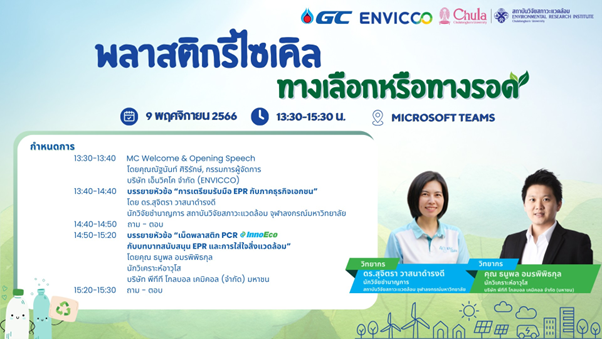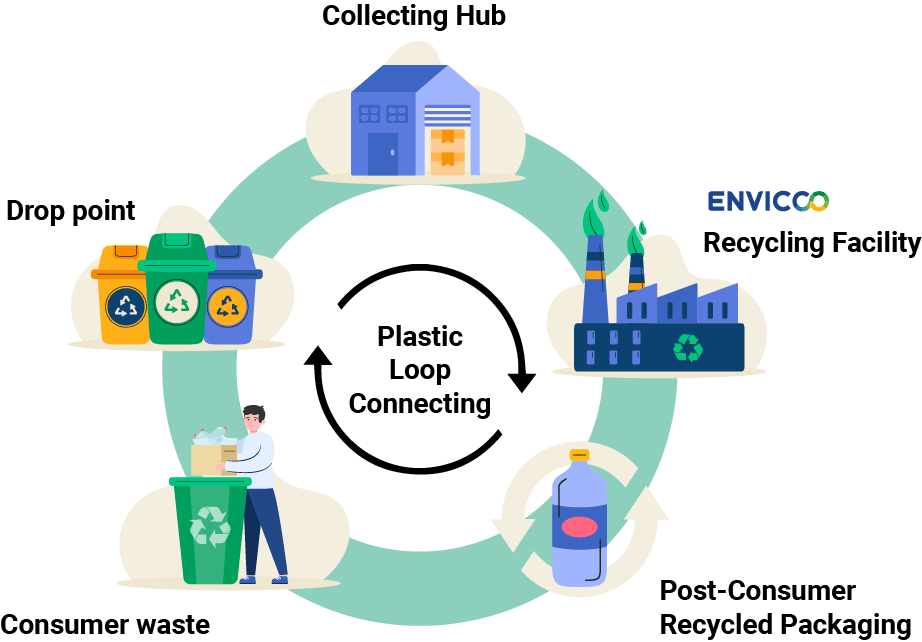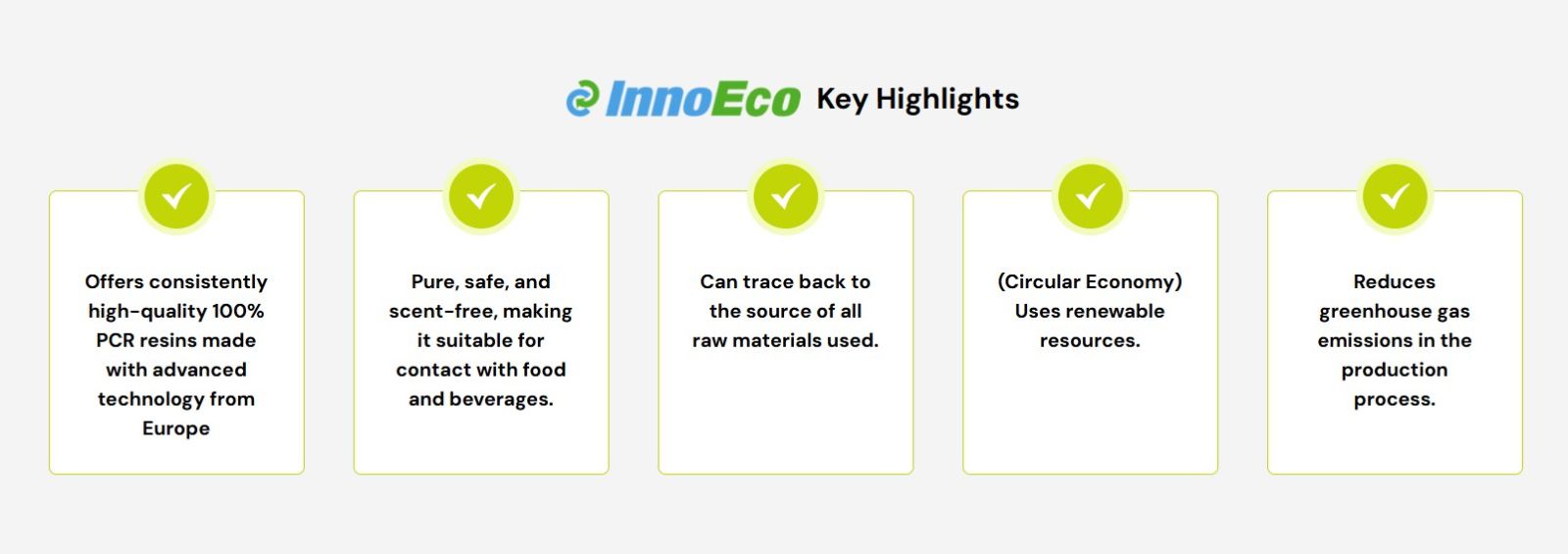GC and ENVICCO Organize Online Seminar "Recycled Plastics: Option or Survival?"
09 Nov 2023
GC and ENVICCO Organize Online Seminar
"Recycled Plastics: Option or Survival?"
November 9, 2023, 1:30 - 3:30 PM, via Microsoft Teams.

The seminar featured a distinguished and expert speakers on the principles of Extended Producer Responsibility (EPR), which extends the responsibility of producers to various stages of product's lifecycle, particularly in the areas of return, recycling, and disposal phases, to reduce the environmental impact of products. The speaker was Dr. Sujitra Vassanadumrongdee, Senior Researcher, Environmental Research Institute, Chulalongkorn University.
The Waste Crisis in Thailand
- Thailand generates approximately 27 million tons of waste per year, equivalent to 27 million cars
- We produce average of 1.14 kg of waste per person per day, higher than the average of lower-middle-income developing countries (0.79 kg/person/day)
- It's time for producers and consumers to share responsibility for the environmental costs incurred
- "Waste" is the responsibility of the "waste generator," according to the Polluter Pays Principle (PPP)
- "Waste" is not solely the burden of local administrative organizations. The state must address market failures that do not include environmental costs through mechanisms such as EPR, taxes/fees into funds, etc.
What is EPR?
EPR is policy principle used globally as a basis for legislation or measures that involve product manufacturers in taking responsibility for their products throughout their life cycle. The first law to adopt the EPR principle was Germany's Packaging Waste Management Act in 1991. Due to the success of this law in reducing the amount of packaging waste sent for disposal and increasing packaging recycling rates, various European countries began using the EPR principle as a basis for legislation to manage waste that is difficult for local authorities to handle, such as electronic waste, end-of-life vehicles, tires, and batteries.
Benefits of Future EPR Law Enforcement for Packaging Waste Management
- Recycled material prices will fluctuate less or will be stabilized
- Promotes new entrepreneurs in the market
- There will be transparency in the system, improving the quality of life for waste pickers (Saleng) and scrap shops
- The public can conveniently return used packaging
- Local Administrative Organizations (LAOs) will collect separately, and drop-off points will be available at malls, convenience stores, and gas stations
- There will be promotions for exchanging used packaging for new products
- The public will be more aware and will separate waste more
Currently, there are pilot projects and EPR laws in Thailand and neighboring countries. For example, the PRO Thailand Network project drives sustainable packaging management under the EPR principle. It is collaboration of leading partner companies in Thailand. Neighboring countries such as Singapore, Vietnam, Indonesia, and the Philippines have already enacted EPR laws to manage packaging waste, plastic waste, e-waste, and various product scraps.
In Thailand, draft of Sustainable Packaging Management Act has been prepared, and the Pollution Control Department has set roadmap to draft a CE/EPR law for packaging, aiming for enforcement by 2026, and draft law to promote CE by 2027.
GC and ENVICCO jointly presented on the topic of "PCR InnoEco by GC and their role in supporting EPR and environmental awareness" by Mr. Thanoopon Amornphiphitkul, Senior Analyst, PTT Global Chemical Public Company Limited.
.jpg)
Presentation Topics
1. ENVICCO’s PCR – Quality, Safety, and Environmental Impact
- ENVICCO’s PCR Plastic Circular Economy Collaboration across the Plastic Supply Chain

- Introducing products under the brand InnoEco by GC, made from post-consumer household plastic using European standard recycling technology to obtain high-quality Post-Consumer Recycled (PCR) plastic resins with properties comparable to virgin plastic
- 100% PCR PET food-contact plastic resins, the first in Thailand to pass safety standards from the Thai Food and Drug Administration (FDA), Ministry of Public Health. It can be used for food packaging of all sizes and thicknesses
- 100% PCR PET food-contact plastic resins that have passed international safety standards from both the U.S. Food and Drug Administration (US FDA) and the European Food Safety Authority (EFSA). It can be used to form recycled plastic packaging such as drinking water bottles and soft drink bottles

- 100% PCR HDPE packaging-grade plastic resins with advanced odor removal technology. It can be used to form recycled plastic packaging such as shampoo bottles, soap bottles, and oil gallons
- All raw materials are 100% post-consumer household plastic from Thailand. GC collaborates with ENVICCO to establish recycling waste management centers in several provinces, catering to people's lifestyles and promoting recycling behavior, as well as creating comprehensive community waste management system in Rayong, Nakhon Pathom, and other provinces. The ‘GC YOUเทิร์น’ platform is used to manage the process from sorting, collection, and transportation to the ENVICCO factory for sorting and cleaning before entering the recycling process. This involves property enhancement through world class technology and innovation, resulting in high-quality recycled plastic resins Furthermore, advanced traceability system is installed, enabling 100% tracking of the origin of the used plastic.
2. Challenges / Questions Regarding Recycled Plastic Resins
- Challenges in designing packaging for easy recyclability: The use of colored bottles, labels made of PVC, and printing directly on bottles make recycling more difficult.
- PET bottles can be repeatedly recycled due to technology that can remove foreign substances and improve the properties of PCR PET resins to be comparable to virgin plastic. It can be recycled repeatedly, but the color of the bottles will become darker. (Globally, recycled plastic resins tend to be darker and different from virgin plastic due to the cleaning and high-temperature production processes to ensure cleanliness and safety. The darker color of recycled plastic resins signifies environmental consciousness and safety.) In Europe and the United States, where the use of recycled content is widespread, almost equal to virgin plastic (recycling has been used for over 10 years abroad), bottle colors are darker. In the meantime, the Thai market is just beginning to use it, and brand owners need to communicate and educate consumers from the start.
- Challenges from consumer behavior, especially the lack of waste sorting, which makes recycling inefficient.

